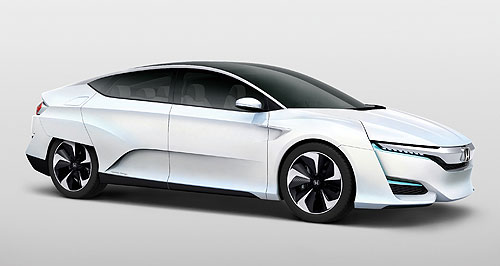Make / Model Search
Future models - Honda - FCV - ConceptHonda's next-gen FCV Concept revealedSpace saver: Honda claims its FCV Concept is the first vehicle of its kind to fit both the powertrain and fuel-cell stack inside the front end of the car, meaning much more interior space as the fuel-cells are no longer running in the centre tunnel. FCV Concept previews the future of Honda's hydrogen fuel-cell technologyGallery Click to see larger images 18 Nov 2014 By TUNG NGUYEN UPDATED: 20/11/14HONDA has unveiled its next evolutionary step of hydrogen fuel-cell vehicles in the form of its FCV Concept, set to go on sale in some markets in 2016. The FCV Concept – the successor to the 2008 Honda FCX Clarity – uses a newly-developed fuel-cell stack that reduces the fuel-cell size by 33 per cent that, coupled with a high-pressure hydrogen storage tank, has a claimed range of more than 700km. Honda says refuelling its latest environmentally friendly offering is expected to take approximately three minutes under optimal conditions. Although the fuel-cell has shrunken, power output is still expected to be more than 100kW with output density as high as 3.1kW/L, which represents a performance improvement of “approximately 60 per cent compared to the previous version of the fuel-cell stack,” Honda said in a statement. The Japanese car-maker is also touting flexibility in the production version of the FCV Concept, managing to squeeze the entire powertrain and fuel-cell stack inside the hood of the vehicle, resulting in increased cabin space and allowing for varying body-styles. Also revealed was Honda's Power Exporter Concept, a portable device powered by the electricity from the FCV Concept that can be used like a power generator in case of emergencies. This is possible because hydrogen fuel-cell vehicles are powered by the electricity that is generated by reacting hydrogen with oxygen providing clean and CO2-free energy. Although fuel-cell vehicles offer a greater driving range and shorter refuelling times when compared with purely electric vehicles, the biggest hurdle to overcoming wide-spread adoption is the lack of infrastructure to support FCVs. Honda Australia director Stephen Collins highlighted the Japanese car-maker's prior experience in developing and producing hydrogen fuel-cell vehicles, but said there are barriers to the technology being introduced in Australia. “Honda was a pioneer in hydrogen technology and the first to lease a production vehicle powered by a hydrogen fuel cell: the FCX Clarity that emits only water,” he said. “We are very proud of our leadership in this area. “This technology – currently available in Japan, the US and some parts of Europe – is unfortunately a long way off for Australia. We would be very interested in bringing the Honda FCV to our market, however with the current lack of infrastructure, the business case doesn't add up. “In Australia, there is very limited hydrogen refuelling infrastructure or a clear plan for the integration of hydrogen as a fuel source.” Only a handful of hydrogen refuelling stations are available around the world – none of which are in Australia – but many car-makers have joined together in various programs, such as Clean Energy Partnership, H2 Mobility and HyFIVE, to build the required hydrogen infrastructure in selected markets. The Honda FCV Concept is set to go on sale in Japan in March 2016, with subsequent releases in the United States and Europe some time later. Japanese rival today confirmed the production version of its FCV – dubbed Mirai – that will beat Honda's effort to the market as it goes on sale in Japan in November ahead of a wider roll-out in Europe and the United States next year. Honda's previous model, the FCX Clarity, was available to individual lease customers in 2005 in the US with wider lease sales kicking off in 2008.  Read more25th of June 2014  First look: Toyota shows fuel-cell car for the roadToyota set to take the hydrogen route with fuel-cell sedan – but no time soon on Oz20th of November 2013  Tokyo show: Toyota looks to future with FCVToyota confirms hydrogen fuel-cell FCV just 12 months away from productionAll future models Alfa Romeo Alfa Romeo Abarth Abarth Alpine Alpine Alpina Alpina Audi Audi Aston Martin Aston Martin BMW BMW Bentley Bentley Chery Chery Brabham Brabham Chrysler Chrysler Chevrolet Chevrolet Cupra Cupra Citroen Citroen DS DS Dodge Dodge Fiat Fiat Ferrari Ferrari Foton Foton Ford Ford Great Wall Great Wall FPV FPV Haval Haval GWM GWM Honda Honda Holden Holden Hummer Hummer HSV HSV Infiniti Infiniti Hyundai Hyundai Jaguar Jaguar Isuzu Isuzu Kia Kia Jeep Jeep Land Rover Land Rover Lamborghini Lamborghini Lexus Lexus LDV LDV Mahindra Mahindra Lotus Lotus Mazda Mazda Maserati Maserati Mercedes-AMG Mercedes-AMG McLaren McLaren MG MG Mercedes-Benz Mercedes-Benz Mitsubishi Mitsubishi Mini Mini Opel Opel Nissan Nissan Peugeot Peugeot Pagani Pagani Proton Proton Porsche Porsche Renault Renault Ram Ram Rover Rover Rolls-Royce Rolls-Royce Skoda Skoda Saab Saab SsangYong SsangYong Smart Smart Suzuki Suzuki Subaru Subaru Toyota Toyota Tesla Tesla Volvo VolvoMotor industry news |
Click to shareHonda modelsResearch Honda All future models Alfa Romeo Alfa Romeo Abarth Abarth Alpine Alpine Alpina Alpina Audi Audi Aston Martin Aston Martin BMW BMW Bentley Bentley Chery Chery Brabham Brabham Chrysler Chrysler Chevrolet Chevrolet Cupra Cupra Citroen Citroen DS DS Dodge Dodge Fiat Fiat Ferrari Ferrari Foton Foton Ford Ford Great Wall Great Wall FPV FPV Haval Haval GWM GWM Honda Honda Holden Holden Hummer Hummer HSV HSV Infiniti Infiniti Hyundai Hyundai Jaguar Jaguar Isuzu Isuzu Kia Kia Jeep Jeep Land Rover Land Rover Lamborghini Lamborghini Lexus Lexus LDV LDV Mahindra Mahindra Lotus Lotus Mazda Mazda Maserati Maserati Mercedes-AMG Mercedes-AMG McLaren McLaren MG MG Mercedes-Benz Mercedes-Benz Mitsubishi Mitsubishi Mini Mini Opel Opel Nissan Nissan Peugeot Peugeot Pagani Pagani Proton Proton Porsche Porsche Renault Renault Ram Ram Rover Rover Rolls-Royce Rolls-Royce Skoda Skoda Saab Saab SsangYong SsangYong Smart Smart Suzuki Suzuki Subaru Subaru Toyota Toyota Tesla Tesla Volvo VolvoMotor industry news |




















Facebook Twitter Instagram